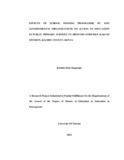| dc.contributor.author | Kariuki, John K | |
| dc.date.accessioned | 2013-08-26T13:47:42Z | |
| dc.date.issued | 2013 | |
| dc.identifier.citation | Kariuki John Kaguongo. (2013). Effects Of School Feeding Programme By Non Governmental Organizations On Access To Education In Public Primary Schools In Drought-stricken Kakuzi Division, Kiambu County, Kenya. A Research Project Submitted in Partial Fulfillment for the Requirements of the Award of the Degree of Master of Education in Education in Emergencies University Of Nairobi. | en |
| dc.identifier.uri | http://erepository.uonbi.ac.ke:8080/xmlui/handle/123456789/56250 | |
| dc.description.abstract | There exist disparities in terms of access to primary education in Kenya on the basis of gender and region. ASALs are the worst hit despite efforts by the government such as the school feeding programmes and the free primary education. Over 70% of children in these districts do not participate in the learning process. The report by the Government of Kenya shows that only 36% of the school going children in the ASAL areas are in school. A section of Central region of Kenya such as Kirimiri location in Kakuzi Division in Kiambu County has affected by drought and many of the children are malnourished which has made majority stay away from school. Non Governmental Organizations came up with the school feeding programme aimed at alleviating the hunger and keep the children in school. The purpose of this study was to investigate the effect of NGO’s school feeding programmes on access to primary education in drought-stricken Kakuzi Division, Kiambu County. The objectives of the study were to establish the effect of school feeding programme on primary school enrolment, find out how the school feeding programme has affected pupils attendance of school, determine the effect of school feeding programme on active involvement of pupils in classroom learning and to establish the effect of school feeding programme on the retention of pupils in primary school in drought stricken Kakuzi Division. The study adopted a descriptive survey research design in which 450 respondents comprising of 10 head teacher, 56 teachers and 400 pupils were sampled. The study used questionnaires to collect data which were self administered. The questionnaires had both closed and open ended questions. Data was analysed both qualitatively and quantitatively. The study established that school feeding programme influenced the enrolment of pupils in primary school in Kakuzi division. The study also established that the school feeding programme influenced the attendance of pupils in schools in Kakuzi division. The study further established that with the introduction of SFP, there has been increased active involvement of pupils in class. The SFP also influenced the retention rate of the pupils in Kakuzi division as child labour featured a number one cause of low retention of pupils in school. The study recommends that the government should increase the coverage of the areas under school feeding programme in the drought prone areas with the view to improving the enrolment rates. The government should ensure there is a constant supply of school feeding programme so as to maintain regular school attendance. The government and the donors should ensure the school feeding programme has the right nutrients so as to keep the children alert in class to actively participate in the learning process. The study the government should ensure that all the schools in the dry areas have SFP so that hunger does not force any child to drop out of school. | en |
| dc.language.iso | en | en |
| dc.publisher | University of Nairobi, | en |
| dc.title | Effects of school feeding programme by non governmental organizations on access to education in public primary schools in drought-stricken Kakuzi division, Kiambu county, Kenya | en |
| dc.type | Thesis | en |
| local.publisher | School of Education | en |

